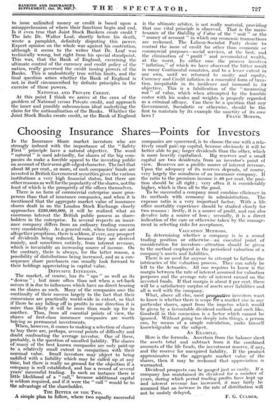Choosing Insurance Shares Points for Investors
IN the Insurance Share market investors who are strongly imbued with the importance of the " Safety First ' principle have a natural objective. The word " natural " is used advisedly, for shares of the big com- panies do make a forcible appeal to the investing public on account of their semi-gilt-edged character. The fact that about 36 per cent., or more, of such companies' funds are invested in British:Government securities gives the various institutions a very high financial status, but there are other reasons as well for the popularity of the shares, not the least of which is the prosperity of the offices themselves.
There is no form of commercial enterprise more pros- perous than that of insurance companies, and when it is mentioned- that the aggregate market value of insurance shares dealt in on the London Stock Exchange closely approaches /230,000-,000, it will be realized what an enormous interest the British public possess as share- holders in the enterprise. In several respects an insur- ance company differs from an ordinary trading concern very considerably. As a-general rule, when times are not altogether propitious, thereiS seldom-, if ever, any prospect of dividends being reduced, beeause they are derived mainly, and sometimes entirely, from interest revenue, which is invariably an increasing source of income. On the contrary, there is always, for the latter reason, a pOssibility of distributions being increased, and as a con- sequence share purchasers can usually look forward to their holdings appreciating in capital value.
DIFFUSIVE INTERESTS.'
The market, of course, has its " ups " as well as its "downs " ; but rifore often than not when a set-back occurs it is due to influences which have no direct bearing on the shires as such. Many of the companies owe the continuity of their success largely to the fact that their connexions are practically world-wide in extent, so that if here be any falling off in profits in one direction it is more than likely it will be more than made up for in another. Thus, from all essential points of view, the shares of first-class insurance companies are worth bliying as permanent investments.
'When, however, it comes to making a selection of shares to Ibuy there are, perhaps, several points of difficulty and dbUbt confronting the average investor. • One of these, probably, is the question of uncalled liability. The shares of (many of the best known companiei-ire only paid-up to a relatively small extent in comparison with their nominal value. Small investors may 'object to being saddled with a liability which may be &died Up 'at any time, but there is really no ground for the objection if a company is well established, and has a record of several years' successful trading. In such an instance there is- little likelihood of a " call," because additional capital is seldom required, and if it were the " call " would be to the advantage of the shareholder.
THE BETTER OF THE Two.
A simple plan to follow, where two equally- successful companies are concerned, is to choose the one with a rela- tively small paie,-up capital, because obviously it will be better able to pay larger dividends than-the other, which is more heavily capitalized. Big reserves and a small capital are two desiderata from an investor's point of view. Reserves are a prolific source of interest revenue. Upon the adequacy of its reserves depends, of course, very largely the soundness of an insurance company. If the ratio to the premium income is 40 per cent, the posi- tion should be all right ; very often it is considerably higher, which is then all to the good.
To be successful a company must combine efficiency in its methods with economy in administration. The expense ratio is a very important factor. With a life office mortality experience should be studied closely for two reasons : firstly, it is a source of profit, and can also devolve into a source of loss ; secondly, it is a direct indication of the care or otherwise taken by the manage- ment in selecting risks for acceptance.
VALUATION METHODS.
In determining whether a company is in a sound trading position or otherwise—an essential point of consideration for investors—attention should be given to the method employed in the periodical valuation of a company's assets and liabilities.
There is no need for anyone to attempt to fathom the intricacies of the valuation process. They can safely be left to the Actuaries. -All one requires to know is the margin between the rate of interest assumed for valuation purposes and the average rate of interest earned on the invested funds. If that margin is about 2 per cent. there will be a satisfactory surplus of assets over liabilities and all is well with the company. - What, above all else, most prospective investors want to know is whether there is scopefar a market rise in any particular shares, apart from the impetus which would be given by a favourable dividend outlook and such like. Goodwill in this connexion is a factor' which. cannot be ignored. Without going too deeply into -things, a person can, by .means of a simple calculation, make himself knowledgeable on the- -subject.
AN EXAMPLE.
Here is the formula. Ascertain from the balance sheet the assets total and subtract from it the combined amounts of the life funds, the investment reserve, if any, and the reserve for unexpired liability. If the product approximates to the aggregate market value of the shares, then it may be reckoned that appreciation is warranted. Dividend prospects can be gauged just as easily. If a company has maintained its dividend for a number of years; during -which period:trading profits have kept up and interest revenue has increased, it may fairly be assumed that an increase in the rate of distribution will not be unduly delayed._ F. G. CULMERI.


























































 Previous page
Previous page